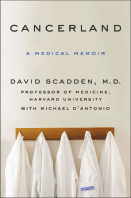Cancer memoirs are generally written by people who have an intimate relationship with the disease, mostly survivors, sometimes by those who are dying while writing, such as the breathtaking book, The Bright Hour: A Memoir of Living and Dying, by the poet Nina Riggs. Once in a while, a scientist or physician who has spent the better part of his or her life working to find a cure writes a memoir about those efforts. This variety of memoir is usually dry and overly scientific, appealing to a select readership of medical professionals.

However, a new memoir, Cancerland: A Medical Memoir, by acclaimed stem cell researcher, David Scadden, MD, chronicles his 40-year devotion to the problem of cancer as it presents in our lives and in our laboratories, as well as its wider implications in its social context. Dr. Scadden and coauthor Michael D’Antonio, a Pulitzer Prize–winning journalist, provide readers with an interesting narrative.
Cancer in the Closet
DR. SCADDEN opens the book by turning back the pages of time to the 1950s, in his hometown town of Wyckoff, a middle-class suburb in Bergen County, New Jersey. It was a time when cancer was still whispered about and, to some of Dr. Scadden’s neighbors, “a product of moral failure or spiritual crisis.”
BOOKMARK
- Title: Cancerland: A Medical Memoir
- Author: David Scadden, MD, with Michael D’Antonio
- Publisher: Thomas Dunne Books/St. Martin’s Press
- Publication date: July 2018
- Price: $27.99, hardcover, 320 pages
In his early years, Dr. Scadden knew three people who died of cancer: the mother of his best friend, who “withdrew from view”; a next-door neighbor who had lung cancer; and a second-grade classmate, who “just didn’t come to class anymore. He never came back. No one seemed to know where he went, and it was made clear that we shouldn’t talk about him. Only years later did I learn he had died of leukemia.”
Organized in nine chapters, plus a terrific postscript, “Science in the Future Tense,” Cancerland is actually two books in one, a riveting history of cancer research, with Dr. Scadden’s own work deftly interwoven, and a scientific review of the best and most promising advances coming out of the lab today. Lay readers who enjoy the book’s early passionate storytelling may find some of the latter chapters too heavy with medical jargon.
Immunotherapy
DR. SCADDEN, who cofounded the Harvard Stem Cell Institute, gives a compelling history of the controversy around stem cell science, replete with the sociopolitical battles that took place. This part is followed by a well-charted discussion about immunotherapy, beginning with a clearly drawn section on William Coley, MD, the so-called Father of Immunotherapy.
Dr. Coley read about a man who had recurring facial bone cancer, and after developing postoperative streptococcal infection and massive fever spikes, his tumors shrank until they disappeared—which sparked his theory that the body’s immune system could rid the body of cancer. It is an inspirational story of pure scientific pursuit that should be read by everyone pondering a career in medicine.
Cautionary Tales and Gene Hacking
THE STORIES OF DISCOVERING the link between Helicobacter pylori and gastric cancer, as well as human papillomavirus in cervical cancer, are also told with rigor. These are cautionary tales about the roadblocks these two discoveries faced before being embraced by mainstream medicine, and Dr. Scadden uses them to expose how the search for a new “blockbuster” drug can, at times, blind researchers from exploring the cause of a disease first.
In chapter 8, “Gene Hacking,” Dr. Scadden goes deep into the groundbreaking technology developed by the discovery of CRISPR (clustered regularly interspersed short palindromic repeats). This is heady science, but Dr. Scadden, for the most part, breaks it down into digestible bites for readers. The story of the CRISPR array culminated in a successful experiment that proved the process could readily edit genes—a huge leap forward in cancer research.
Respect for the Human Experience
NOT SURPRISINGLY, Dr. Scadden’s writing is at its best when he delves into bone marrow and stem cell research and discovery, as he does in the book’s last chapter, “From Glory to Glory.” He writes, “The blood system begins with the marrow, which I consider a kind of foundry where elements are forged into various cell products.” The activity of the bone marrow is stunning in both its volume and importance to our survival, and it is a fitting way for this fine book to close.
Along with the interesting science and histories, readers will admire Dr. Scadden’s determination and will to pursue work that leads to the betterment of humanity. “We must attend to the human spirit along with the body, and this requires respect for the human experience…. Science in the service of society will give us medicine that is also just,” he comments. This book is highly recommended for readers of The ASCO Post. ■

